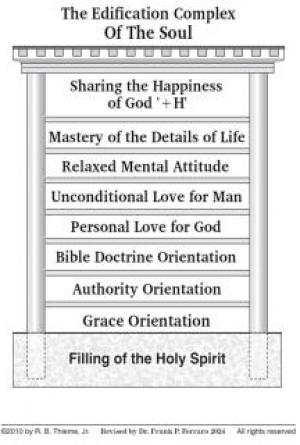Conclusion
So in conclusion, I would like to reiterate that it is only Christianity that holds the view of a triune God. Both Judaism and Islam hold to monotheism. What is the outcome of such beliefs? What are the practical implications of believing in a trinity instead of a monotheistic god? It is my belief and conclusion that God is only represented fully – even if we want to say that the cross is His core character – only when we can embrace this view of the trinity. Likewise, the Church will only have its full stature and character when we embrace this pattern for ourselves.
In the world, we find that people are individuals. I have my beliefs, my opinions, my thoughts, and my life. Of course, these things can affect others around me. But this isn’t true of the Godhead. Jesus might be distinct, but His beliefs, opinions, thoughts, life, character, decisions, etc are the exact same as the Father’s and the Holy Spirit’s. Though these things might affect those outside the Godhead, they do not affect the other parts of the Godhead. They are one in all things.
Jesus had prayed in John 17 that we would be one as He is one. In fact, He even points out that it is in our unity that we display God to the world. God is not monotheistic, and when we describe Him as such, we smear His name and character. I spoke of how the different aspects of God defer to the others, and how they are humble to submit unto the other aspects of the Godhead. Could you imagine a Church that acted in this manner to each other? What kind of glory might that Body obtain?
It is from this view that we can rightfully critique the modern form of church. In all honesty and humility I assure you that what I am about to write is in no way from bitterness. I have seen something that begs the question. When you gain a glimpse into the ultimate reality, anything lesser than that reality cannot go unnoticed. And thus I would like to give both a critique, but also offer an alternative.
It is true in most churches that the leadership is a pyramid. There is one pastor that is the head, and the people even call him that. Yet that title is solely reserved for Jesus Christ. If any person dare call himself or herself the head of this or that church, then they have already come into dangerous waters. Under the pastor might be some sort of staff, or it might be elders that have been appointed privileged. Either way, they are in no place to critique the “heads” actions, because in any serious critique, they might lose position or paycheck.
The Church not only endorses this, but in all actuality prefers this. The majority of saints today desire that only one man stand before the congregation to give messages and exercise leadership. It is the same thing that happened with Moses. The very thing that grieved the heart of God – to be rejected by the people so that they might follow a man – is what we have in our modern day Christianity. One man stands at the front to instruct the congregation of saints that have come together only one day out of the week.
I believe that this rejection of having a multitude of elders that have been distinguished and anointed by the Holy Spirit to lead and to edify is in fact a statement of our condition. Just as it was a statement of the hardness of Israel’s hearts, so too it is a statement of our own rejection of God. The Father originates, the Son reveals, and the Spirit executes. That is not to say that one is over any other. The one that originates is not greater than the one that executes. So it should be in the Body.
In the Body, we have many parts that come together. We all have a variety of talents and burdens and ideas. That isn’t to say that any one is better than another. The one that hears and discerns the Spirit the greatest is no better than the one that encourages. The one that prays effectively is no greater than the one that prophesies. Each one has his or her own distinction from all others, but no one is greater than any other. They all work together as one.
What I am saying is that just as God has 3 different forms that have different purposes, so too the Church is made up of people with different gifts and callings. Those gifts and callings can only be executed in the same mode of humility, self-deference, and character as the Godhead has toward itself. We cannot come hoping to display how much greater we are. We cannot have the attitude of, “Well, they did alright, but I’m going to knock it out of the park with what I have to say…” We have to defer to the other in order to gain the whole counsel of God. It cannot be one hotshot pulpiteer with all the answers.
Knowing God as trinity does not only constitute that we understand God as being three characters all displaying the same thing through different forms. It also declares that God is in eternal fellowship with self. In like manner, the Body ought to be in eternal fellowship with self. We are never outside of the Body and desiring fellowship because we are always with another brother or sister and growing in grace together.
The trinity is a view of relationship. It takes the dynamic view of God instead of the static view. God is never changing. This is true. But He is always progressing. The world has done a number on us in that we have brought a monotheistic view into the Church. We might subscribe to the doctrine of the trinity, but in all practicality, we then live and move and have our being as individuals who only come together. We are not one. Though we might have such and such a doctrine, and though we might meet together and get along great while together, we are in fact not together in the deepest sense of the word. Our hearts are miles away from one another, and we prefer to keep it that way.
These are the sorts of implications that come from the doctrine of the trinity. The Son lived from the life of the Father. In the same way, we ought to live from the life of the Son. But who has the faith to believe that we can even do that? How many of us believe that Christ-likeness is unattainable? How many of us believe that godliness is only going to be achieved when we die? By whose life do you live – by Christ’s or your own?
The kind of life that lives from its own strength instead of the power of the resurrection – which is the life of God – prefers the one man on the platform. It prefers the religious thing that brings no life, but fulfills all obligations. It is partial to the business-like system that would put the one man at the front as the head over the company, and all others must bow under their authority. It is from this system that any worship that comes is pre-ordained and set in stone, the sermon is already pre-planned, the whole service has been predestined.
There is nothing that is spontaneous. The best that might happen is that in the moment, the pastor might decide to speak a little more on this point than he had previously thought to. Maybe the “worship leader” will play the chorus an extra couple times because the reaction is right. It does not constitute maturity, but instead constitutes dependency. The pastor has become a performer because the people are not able to perform that specific function themselves.
It is in the hope of looking up to the platform unto the man of faith and power to absolve self from the demand of they too being men of faith and power. While the man of the hour is up speaking, the one in the pew gets to sit back and relax. There is no demand upon the life of the believer. Comfort and convenience have overcome the people, and it has caused for them to become calloused in heart to a dying generation and the call of God to “go into all the world.”
Wisdom cries in the street. Why do so few Christians? Yet, it is not that we ought to get out the bullhorns. It is still from the lack of power and unction that we find street preachers protesting and crying out, “Turn or burn.” This is still from the same mentality of monotheism in that we view other human beings as being lesser – or “sinners.”
As impressive as a church might be that will place the one man at the front – even with a team of pastors – it can never reveal the glory of God. It takes the very character of God to not boast or practice your authority “over” another. It takes humility and servant hood to submit unto the others. I’m not saying that the pastor must submit to the people and start speaking to those with itching ears. This is in the context of a panel of elders. No one elder or pastor is ever to be considered over another.
At the same time, any person that brings the word of God is to be listened to. When the power of the Holy Spirit speaks a word through a chosen vessel, it does not matter if the person was saved 2 days ago – all are to humble themselves under that word that came forth. Whether God would choose to speak through the youth is another question. We cannot be David’s older brothers that would get offended and desire to push away the word of the Lord.
But if what we have been performing is not the perfect thing from Heaven that has been prescribed, then what is?







